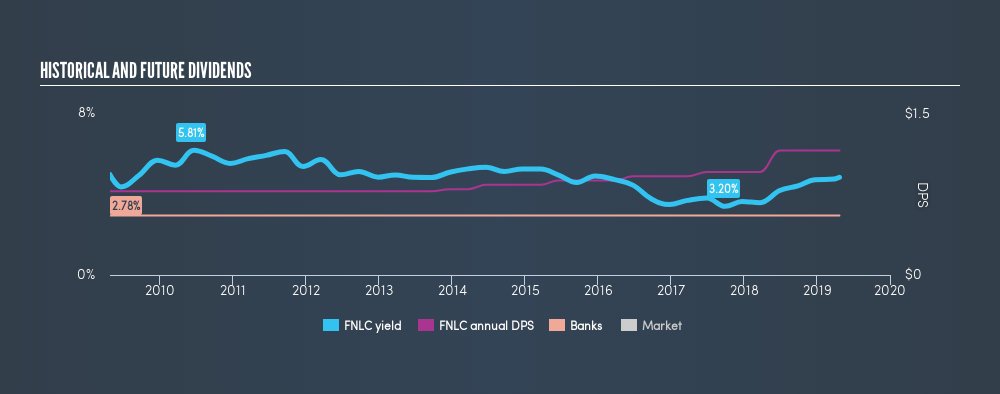
Could The First Bancorp, Inc. (NASDAQ:FNLC) be an attractive dividend share to own for the long haul? Investors are often drawn to a company for its dividend. Yet sometimes, investors buy a popular dividend stock because of its yield, and then lose money if the company's dividend doesn't live up to expectations.
In this case, First Bancorp likely looks attractive to investors, given its 4.5% dividend yield and a payment history of over ten years. It would not be a surprise to discover that many investors buy it for the dividends. When buying stocks for their dividends, you should always run through the checks below, to see if the dividend looks sustainable.
Click the interactive chart for our full dividend analysis
Payout ratios
Dividends are typically paid from company earnings. If a company pays more in dividends than it earned, then the dividend might become unsustainable - hardly an ideal situation. As a result, we should always investigate whether a company can afford its dividend, measured as a percentage of a company's net income after tax. First Bancorp paid out 52% of its profit as dividends, over the trailing twelve month period. This is a healthy payout ratio, and while it does limit the amount of earnings that can be reinvested in the business, there is also some room to lift the payout ratio over time.
We update our data on First Bancorp every 24 hours, so you can always get our latest analysis of its financial health, here.
Dividend Volatility
Before buying a stock for its income, we want to see if the dividends have been stable in the past, and if the company has a track record of maintaining its dividend. For the purpose of this article, we only scrutinise the last decade of First Bancorp's dividend payments. The dividend has been stable over the past 10 years, which is great. We think this could suggest some resilience to the business and its dividends. During the past ten-year period, the first annual payment was US$0.78 in 2009, compared to US$1.16 last year. This works out to be a compound annual growth rate (CAGR) of approximately 4.0% a year over that time.
Dividend Growth Potential
Dividend payments have been consistent over the past few years, but we should always check if earnings per share (EPS) are growing, as this will help maintain the purchasing power of the dividend. It's good to see First Bancorp has been growing its earnings per share at 13% a year over the past 5 years. Earnings per share have been growing rapidly, but given that it is paying out more than half of its earnings as dividends, we wonder how First Bancorp will keep funding its growth projects in the future.
Conclusion
Dividend investors should always want to know if a) a company's dividends are affordable, b) if there is a track record of consistent payments, and c) if the dividend is capable of growing. First Bancorp's payout ratio is within normal bounds. We like that it has been delivering solid earnings growth and relatively consistent dividend payments. First Bancorp fits all of our criteria, and we think it's an attractive dividend idea that would warrant further investigation.
See if management have put their money where their mouth is, by checking insider shareholdings in First Bancorp stock.
We have also put together a list of global stocks with a market capitalisation above $1bn and yielding more 3%.
We aim to bring you long-term focused research analysis driven by fundamental data. Note that our analysis may not factor in the latest price-sensitive company announcements or qualitative material.
If you spot an error that warrants correction, please contact the editor at editorial-team@simplywallst.com. This article by Simply Wall St is general in nature. It does not constitute a recommendation to buy or sell any stock, and does not take account of your objectives, or your financial situation. Simply Wall St has no position in the stocks mentioned. Thank you for reading.
About NasdaqGS:FNLC
First Bancorp
Operates as the bank holding company for First National Bank that provides a range of banking products and services to individual and corporate customers.
Flawless balance sheet established dividend payer.
Similar Companies
Market Insights
Community Narratives


